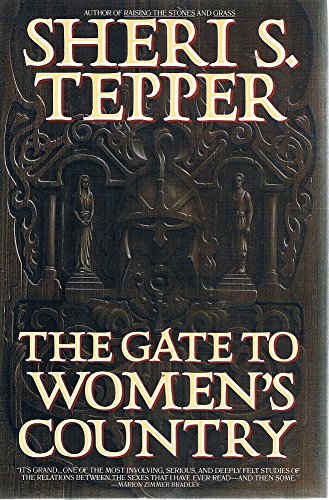Review: The Gate to Women's Country by Sheri S. Tepper
In some future society, Tepper supposes, there will be a way to reduce the human impulse for war.
Although this will require a change in human nature, it can be managed by a simple strategy. Women will marry warriors, but their children will secretly be fathered only by the peaceful "servitors." The women and servitors will raise the children apart from the quasi-military cohorts of men. At puberty, boys will be sent to live with their nominal fathers; while girls must choose (without knowing, though with hints from their lessons) to do the same as their mothers.
Thus everyone gets what they want: militant men get honor and the "naming of sons," women get a peaceful home, children, and a spouse-substitute help-meet, boys get a heroic role model until they are old enough to recognize the quiet power of the servitors.
At age 25, though, the young men face a choice; they may choose conflict and stay with the men, or they may return through the gate to Women's Country and become servitors—and be scorned by their military mates, their commanders and their nominal fathers.
Of all Tepper's novels, this is the one in which I find the most philosophic agreement. For one thing, the "pacifist" men are not helpless wimps; the servitor Joshua and the returned Corrig are both powerful fellows versed in self-defense. For another, women are not either/or: some are strong, but focused on family; some are high-achievers, wielding leading their communities, but puzzled by rebellious daughters.
There is little of the "woman alone against men" flavor of Tepper's later novels. Households are woman plus man plus children, and only the division of woman-led Town versus warrior-led Garrison foreshadows the author's later work.
Tepper's novels often carry an obvious theme accented by a more-subtle leitmotif. Gate is one of the easiest to parse for these elements. Stavia and her mother Morgot, throughout the tale, are occupied with studying their lines to play a part in a recurrent performance of Iphegenia at Ilium, a reworking of the Dionysian play The Trojan Women (usually attributed to Euripedes).
The lines the women recite all concern the suffering of women in the aftermath of war, an overt reason for the divided structure of their utopian (or protopian) society. Underlying this overt theme is the careful husbandry of humanity in the hands of the women, symbolized by Finns with their reindeer herds. Even nearly thirty years after it was written, this poetic coupling of "why" with a plausible "how" gives power to the struggle to move humanity beyond war.
Together, they make this Gate worth opening.

No comments:
Post a Comment